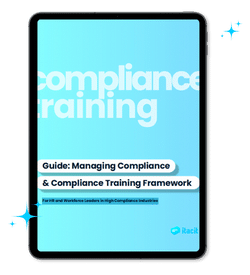In healthcare, where decisions carry the weight of lives, regulations are among the strictest of any industry
These regulations serve to protect patients, staff, and the public in all healthcare facilities. In addition, compliance in healthcare industries ensures a level playing field, where every provider adheres to the same rules, safeguarding both stakeholders and organizational reputations.
Of course, these regulations are necessary. But among these layers of rules and guidelines, ensuring staff compliance can be a complex puzzle. This is where compliance training and tracking become invaluable.
In this article – tailored for HR and workforce leaders in the healthcare sector – we offer practical insights to confidently navigate compliance training challenges in your organization.
Embracing Compliance Training in Healthcare
What is Compliance in Healthcare?
Let’s first briefly touch on the importance of compliance in healthcare and why it’s more challenging compared to many other industries:
- Patient Safety and Quality of Care: Compliance ensures adherence to standards, reducing errors and enhancing the safety and quality of healthcare services.
- Legal and Ethical Obligations: Regulatory compliance establishes legal and ethical guidelines, ensuring healthcare entities operate ethically and according to regional or federal law.
- Protection of Stakeholders: Compliance safeguards the interests of patients, providers, insurers, and the community, preventing harm, fraud, and exploitation.
- Data Security and Patient Privacy: Adherence to regional and federal regulations – like the Health Insurance Portability and Accountability (HIPAA) in the United States or Canada’s Personal Health Information Protection Act (PIPEDA) – protects patient information, ensuring confidentiality and reducing the risk of privacy breaches.
- Reputation Management: Compliance builds trust by showcasing a commitment to ethical practices, contributing to a positive reputation for healthcare organizations.
- Financial Stability: Compliance prevents legal issues and financial setbacks, adding to the stability of healthcare providers.
- Standardization: Regulations establish common standards, promoting interoperability and efficient exchange of patient health information across healthcare systems.
So now that we have a better idea of what is regulatory compliance in healthcare, let’s dig into healthcare compliance training.
What is a Compliance Program in Healthcare?
Your organization’s compliance program is the structured and systematic strategy to ensure adherence to legal, ethical, and regulatory standards.
An effective compliance program is built off a robust, end-to-end training program.

Why is Healthcare Regulatory Compliance Training So Important?
Compliance management in healthcare is about making sure rules are not just established, but deeply understood and followed. That’s where compliance training comes in.
Training is an organization’s best tool to ensure compliance. With knowledgeable and proactive staff members, being compliant to all regulations is ingrained in the culture of the company. Training can make non-compliance become a non-issue.
A comprehensive and engaging training strategy and tools will create a culture of compliance that not only respects rules, but actively contributes to skills improvement and career growth.
Compliance training and job training go hand-in-hand, making it a top priority for Learning and Development (L&D) teams to understand how to integrate them seamlessly into effective training plans.
Best Practices in Healthcare Compliance Training
To manage compliance effectively, healthcare organizations must embrace best practices, with a focus on robust training, as well as the tracking of that training and any associated certifications.
Dynamic training methods, transparent internal controls, prompt corrective actions, and knowledge-sharing all play a vital role.
In many healthcare organizations, staff are Human Services professionals, serving on the front-line, interacting closely with the public on site. To reach all staff equally, a comprehensive mobile workspace training solution is the best way to ensure widespread adherence to mandatory training.
There should also be an emphasis on education at all levels – from C-Level managers to medical staff, physicians, and operators on the front line – and regular reassessment of regulation and regulating bodies’ policies, creating a consistent and adaptive compliance management system.
Core Responsibilities in Healthcare Compliance Training
Human resource and L&D leaders hold a critical role in managing compliance through comprehensive training.
Their responsibilities include fair labor practices, targeted training, aligning performance management with compliance, and establishing a robust internal control environment. They’re effectively responsible for all crucial components in the journey of compliance training and tracking.
Healthcare Compliance Training Checklist
Creating a comprehensive compliance training system in healthcare requires more than a simple checklist. It’s a dynamic, evolving undertaking tailored to the specific needs of healthcare professionals, patients, and the public.
Instead of a checklist for healthcare compliance, your strategy should be built around three main pillars: Organizational Compliance, Legal and Regulatory Compliance, and Safety and Behavior.
Organizational Compliance
At the core of organizational compliance lies the foundation of an employee’s journey within the healthcare system.
- Onboarding training sets the stage, introducing new staff to the organization’s values and expectations. From the start of employment, compliance should be at the forefront of training and integrated in all training initiatives.
- Healthcare industry workers need to be fully aware of the complexities of compliance and the consequences of being non-compliant from day one.
Legal and Regulatory Compliance
Understanding the legal obligations and regulatory landscape in healthcare needs specialized training and review of the applicable laws and requirements of the Department of Health, other government agencies, and regulatory bodies.
- Ethics training emphasizes the importance of ethical standards and ensures alignment with an organization’s internal code of conduct.
- HIPAA and/or PIPEDA training covers data and patient protection, ensuring staff compliance with privacy regulations.
- HR law training provides insights into the legal aspects of human resource management for healthcare workers.
- Manual handling training focuses on the safe and proper handling of medical equipment and patients, minimizing the potential risk of injuries.
Safety and Behavior
Promoting a culture of safety and appropriate behavior in healthcare is a priority for all organizations. It protects staff, patients, and the public. There are many types of training under this pillar, including:
- Workplace safety training to mitigate workplace hazards, such as Occupational Safety and Health Administration (OSHA) standards, or other regional safety regulations.
- First aid training to equip employees with life-saving skills.
- Workplace violence prevention, harassment prevention, and anti-sexual harassment training to create a safe and respectful place to work.
- Diversity training and inclusion training to ensure an environment of equity and understanding.
- Phishing protection and social media training address technological and data protection challenges.
Within your organization, and your specific branch of the healthcare industry, the required mix of compliance regulations needs to be carefully studied.
Healthcare organizations can leverage the efficiency of an end-to-end approach through effective healthcare compliance training. This will develop a healthcare workforce that not only understands the intricacies of compliance, but who also actively contribute to a culture that prioritizes patient well-being, ethical conduct, and workplace safety.
Addressing Non-Compliance Through Training Strategies
Falling out of compliance is a serious matter for healthcare organizations.
Whether discovered internally, or through agencies like the Office of Inspector General (OIG), non-compliance needs to be addressed and rectified promptly.
Addressing non-compliance requires a nuanced approach. If a person, team, or system is deemed non-compliant, impact assessments, compliance history, and intent evaluation must all be undertaken.
Linking this back to training, managers need to distinguish between honest mistakes and intentional misconduct. Using a constructive approach for improvement measures is the best way to connect with staff without alienating or discouraging individuals. That said, more stringent responses are certainly required for intentional misconduct.
It should be determined if non-compliance was the result of a lack of training, intentional misconduct, or an preventable accident. Depending on the result, compliance training activities may need to be adjusted.
Ensuring Continuous Compliance Through Training Adaptability
Effective compliance management requires continuous monitoring and reporting, paralleled with continuous training adaptability.
A proactive approach safeguards against compliance risks, reinforcing a commitment to ethical practices. Managers need to be aware of current regulations, but also all amendments to compliance or new healthcare regulations. That’s why a continuous training strategy is the best way to ensure compliance training is always up to date.
Digitizing Compliance Training and Tracking
But what’s the best way to keep training up to date?
Digitizing compliance training and tracking enhances learning, and is the most effective tool for developing a robust compliance program. Using a Learning Management System (LMS), or end-to-end employee training platform, lets L&D and team leaders easily update training and documentation, and get it to their staff immediately.
Digital employee training platforms allow staff to access training when and where they want, catered to diverse learning styles. From interactive video training to integrated quizzes, an employee app creates an engaging and connected learning experience. On top of that, managers can benefit from course authoring, automated learning paths, and robust compliance tracking.
A digital training approach aligns seamlessly with the evolving nature of healthcare compliance, ensuring that employee training becomes an integrated, streamlined, and efficient process.
Building an Organizational Culture of Compliance Through Training
If your organization can integrate effective compliance training, transparent controls, and continuous improvement, you’ll see that your staff will embrace a culture of compliance at all levels. This cultural transformation prioritizes patient well-being, ethical conduct, and workplace safety.
With a parallel training model for both compliance training and skills development, employees across your organization will understand compliance issues while advancing their careers. Making this training engaging and easy-to-access is essential to maximize the benefit for both the individual and the organization.
Ready to discuss how these strategies can be incorporated into your organization?
With an employee platform designed specifically for healthcare industries, you can be confident your staff will have the best tool in their hands. Let’s start a conversation.
How can training strategies address instances of non-compliance effectively?
Training strategies address non-compliance by distinguishing between inadvertent errors and intentional misconduct. A constructive approach is taken for improvement measures, while intentional misconduct necessitates more stringent responses.
Can healthcare compliance training help create the best patient care?
Compliance training ensures that healthcare workers adhere to the highest professional standards and carry out safe and effective patient care. It instills a culture of ethical conduct, patient data protection, and safety, creating an environment where patient well-being is prioritized.
What role does continuous training adaptability play in healthcare compliance?
Continuous training adaptability is crucial for sustained compliance success. It involves regularly updating training programs to align with the evolving regulatory landscape, leading to a proactive and resilient approach to compliance training.
What is a healthcare compliance officer?
A healthcare compliance officer, also known as a compliance manager or officer, is a professional responsible for overseeing and managing the compliance plan within a healthcare organization. Their primary focus is to prevent, detect, and address instances of non-compliance and advise on corrective action if necessary.










